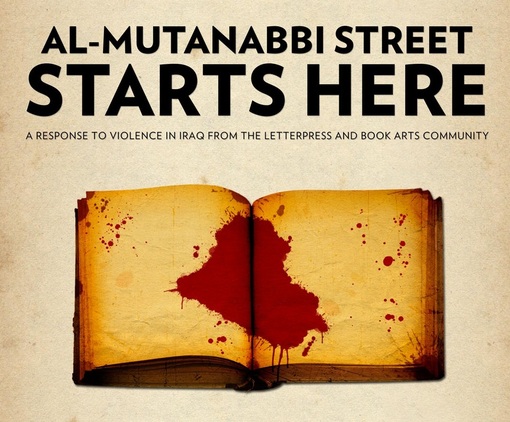Al-Mutanabbi Street Starts Here
“Only in art, only through imagination, do we all genuinely become equal. Because the emphasis is not just on how different we are but also on how similar we are, the fact that we’re all human, and the fact that we all share this universal space. And once you understand the Iraqi mother who loses her child grieves over it in the same manner that an American woman does, you can’t help but be present.” Azar Nafisi
 Iraqi Peace Song, Laurie Alpert
Iraqi Peace Song, Laurie Alpert
This month, the Harrison Center, in partnership with the Herron Art Library at IUPUI has the privilege of exhibiting a rare collection of broadsides and handmade art books which are part of the travelling exhibit “Al-Mutanabbi Street Starts Here.” Those of us who love books, who eschew e-readers because we love the smell of a real book and the sound of turning paper, often take for granted the fact that we are always within easy driving distance of a bookstore and can access every volume in the known world through Amazon. It is not so in the rest of the world.
In my years living in the Middle East, one of my most challenging activities (besides dusting) was my weekly shopping trip. In most large Middle Eastern cities, shops are grouped by type of merchandise and are tucked into individual enclaves in various areas of the city. I would taxi from one side of the city to the other, criss-crossing crowded, winding streets to find the “thread street” (a line of 7 or 8 shops selling all things “sewing and mending”), the aromatic “coffee street,” the “gold street” (if I was lucky), always ending my day at the “fruit and vegetable street,” for the heaviest load. Baghdad’s Al-Mutanabbi Street is the “book sellers street” where students buy comic books and blank notebooks for school, extremist clerics tout their works, and subversive scholars and intellectuals browse shelves jammed with banned books -- from Western children’s stories to Marxist manifestos to underground revolutionary newspapers. Named after Al-Mutanabbi (915-965 A.D.), who was considered to be one of the greatest poets of the Arabic language, also known for his incredible memory (legend claims he once memorized a thirty-folio book after one reading), the street is considered the cultural and literary center of Iraq. In many cultures, past and present, when tyrants desire to obliterate a people, they begin by destroying their literature and art, hoping to dismantle their culture. They target books, because books encourage remembering. But historically, whenever books and art are being obliterated, there have always been a courageous few who recognized the value of preserving that culture and history and carefully hid it away. From the monks in the Middle Ages, who preserved not only scrolls of scripture but also the history and ancient literature of Western Civilization, to the Afghani staffers of the National Museum of Kabul who protected artwork intended for destruction by the Taliban, a dedicated few have always gathered and preserved remnants of their culture.
On March 5, 2007, a suicide bomber drove into the middle of the ever crowded Al-Mutanabbi Street and detonated his car, killing 30 people, wounding 100 others, and destroying countless books and papers. “The intent of the bomber was to prevent the free discussion that books attract. And, to a degree, he was successful. But so long as we do not forget to remember, he will not, in the end, prevail” (Thomas Christensen, Remembering Al-Mutanabbi). Soon after, the Al-Mutanabbi Street Coalition was formed as a place for artists to respond to this tragedy. The Coalition first issued a call to letterpress printers to create broadsides, and then to book artists to create works that “reflect both the strength and fragility of books, but also show the endurance of the ideas within them.” Artists from 26 countries joined the Coalition, creating work reflecting the premise that “wherever people talk freely and creativity breathes, Al-Mutanabbi Street starts.” One complete collection has been preserved for the Iraq National Library in Baghdad, while two other collections can be seen in ten galleries and universities around the world this year. The Katrina Basile Gallery at the Herron School of Art and Design- The Herron Art Library of IUPUI University library has the great distinction of being chosen to host one collection from October 31- November 22, 2014. This Friday, the collection can be seen in Gallery 2 of the Harrison Center as part of our First Friday gallery opening.
Seven Voyages, Michael Pisano
The newly reopened National Museum of Kabul (with it’s carefully hidden and salvaged art collection on display) bears a banner with the motto "A nation stays alive when its culture stays alive." “Through his act of remembering, al-Mutanabbi helped to keep his culture alive. By remembering the poet, al-Mutanabbi Street did the same. And by remembering al-Mutanabbi Street, we keep alive the seeds of freedom” (Beau Beausoleil, curator of the Al-Mutanabbi Street Project).


